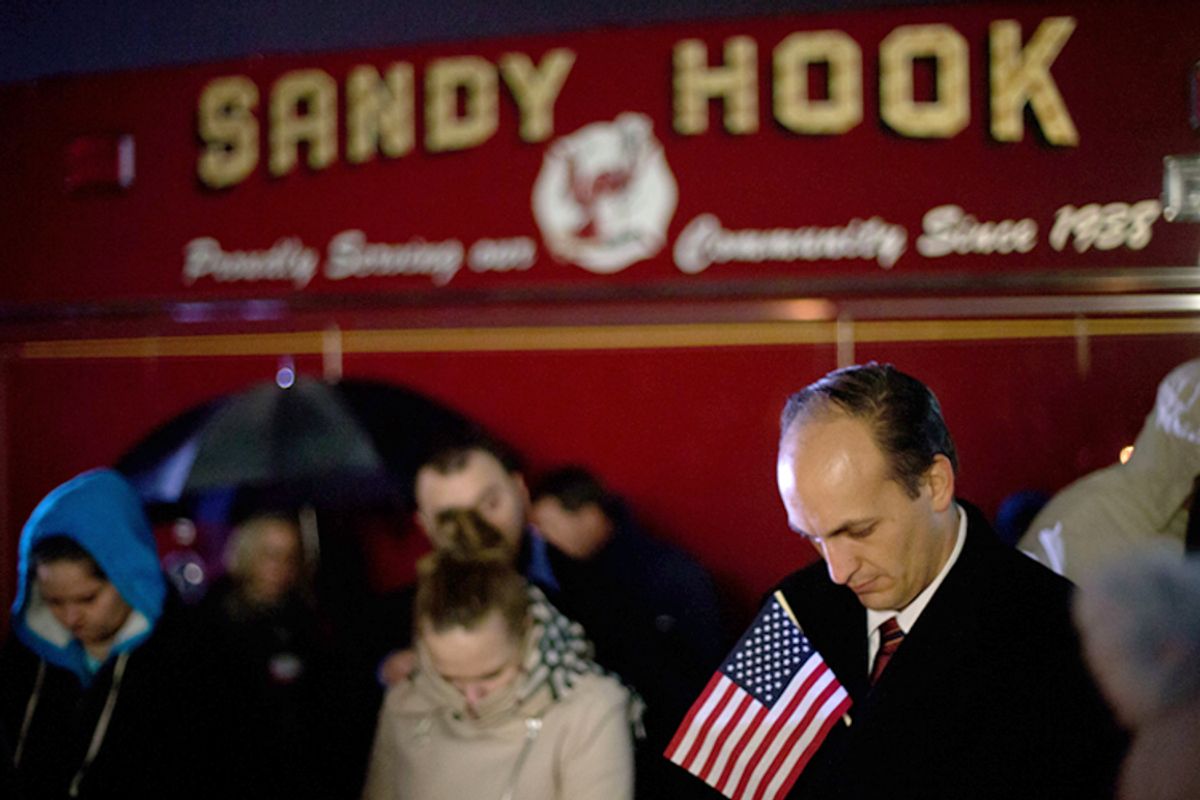There's one time, and only one time, you can count on the NRA to be more subdued than your average gun obsessive, and it's the 24 to 48 hours after a mass shooting.
As of this writing, it's been over 36 hours since the NRA issued any pro-gun public communication, and if past is prologue they'll lay low until the jaded public accepts that nothing will become of the killing spree at DC's Navy Yard, then return to their regular program of advocating for an armed society and stoking far-right paranoia.
Two entwined calculations motivate the temporary silence. The first is simple self-preservation. The gun lobby is at its weakest when crazy people use the weapons it has made so easily obtainable to slaughter innocents in public places. The second is more oblique. Mass shootings breathe new life into arguments for gun control, and one way to suffocate them is to feign propriety and indignation -- to shame adherents into saying nothing until the public has moved on.
Thus, nothing is more offensive to a conservative after a mass shooting -- with the exception, perhaps, of the killer's action itself -- than any effort to tie it to arguments about gun control.
This particular mass shooting has a little something for everyone who's inclined to be an asshole. If racism is your thing, you'll be relieved to learn that deceased shooting suspect Aaron Alexis was black.
If you think the statements President Obama made about Trayvon Martin's killing were evidence of reverse racism hiding in plain sight, yesterday was a banner day, as Slate's Dave Weigel has already documented.
What to expect now.. The #NRA will be blamed, the #Navy will be blamed.. #Obama will NOT say if he had a son he would look like the shooter.
— Joe Pags - Official (@JoeTalkShow) September 16, 2013
Elsewhere, the same conservatives who were policing the media for even vague hints of gun skepticism were also regurgitating easily falsifiable bromides about the benefits of arming more Americans.
"The only thing that stops a bad guy with a gun is a good guy with a gun."
"Isn't it weird how gunmen always go on rampages in gun-free zones?"
As if good guys with guns never cause violent situations to escalate, or a place called Navy Yard in the nation's well-fortified capital city was somehow gun-free.
Yesterday, all of that stuff was "on limits." The one taboo on the right was gun control. Conservatives closed ranks around lax restrictions on private gun sales before the shelter in place order at Navy Yard had been lifted. Confirmed details were still scarce, but already we knew that the proper regulatory response to the incident was "nothing" and that suggesting otherwise was foolish and insensitive.
The arguments are depressingly familiar. Despite previous gun-related infractions, and a history of mental illness, Aaron Alexis had somehow cleared background checks pursuant to both his service in the Navy Reserve, from which he received a general discharge, and his work as a military contractor. So clearly universal background checks for private purchases wouldn't do any good either, right?
This is about as fallacious as arguing that cars should be liberated from all future safety regulations because airbags sometimes fail. If there are problems with existing background check systems, then they should be improved and best practices carried forward into a universal background check system for private sector gun sales. Instead, we're left with the system that allowed Alexis to legally purchase a shotgun in Virginia just last week.
His record paints a picture of a troubled individual who had several brushes with the law but none that crossed into felony conviction territory that would have prohibited him from buying a gun from a federally licensed gun dealer.
Although he recently began seeking mental health treatment through the Veteran’s Administration, seeking treatment and even having a diagnosed mental illness don’t disqualify someone from purchasing a gun.
Tighten the laws and the next Alexis is more likely to be thwarted or deterred. But the laws won't be tightened. Instead, we'll be left to process multiple mass shootings a year with rote expressions of outrage and dismay, and then to move on.
Now mass shootings are relatively rare, and it would be nonsensical for frustrated or frightened citizens to quit their jobs or home-school their kids simply because politicians have no intention of trying to stop them. But with little encumbrance to gun enthusiasts, the status quo could be improved. If fatal airline accidents became much more common in the U.S. than they are right now, or than they are in other countries, it would be bizarre for a political movement to rise up after each tragedy to shout down anyone demanding tougher FAA safety inspections. But that's about where gun obsessives in this country are right now.



Shares